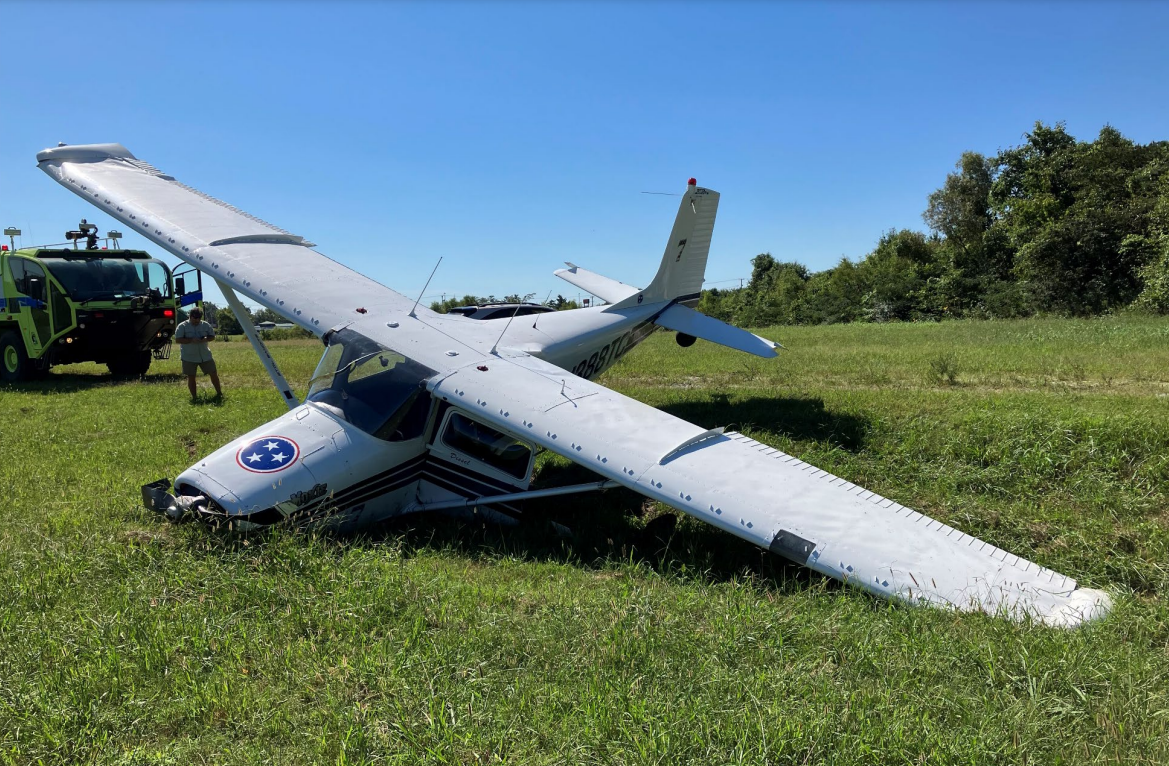
ASN Wikibase Occurrence # 282832
This information is added by users of ASN. Neither ASN nor the Flight Safety Foundation are responsible for the completeness or correctness of this information.
If you feel this information is incomplete or incorrect, you can submit corrected information.
| Date: | Tuesday 13 September 2022 |
| Time: | 11:32 |
| Type: |  Cessna 172 Skyhawk |
| Owner/operator: | Private |
| Registration: | N388TC |
| MSN: | 29601 |
| Year of manufacture: | 1956 |
| Total airframe hrs: | 3489 hours |
| Engine model: | Franklin 6A-335B1 |
| Fatalities: | Fatalities: 0 / Occupants: 2 |
| Aircraft damage: | Substantial |
| Category: | Accident |
| Location: | near Chattanooga-Lovell Field Airport (CHA/KCHA), Chattanooga, TN -
 United States of America United States of America
|
| Phase: | Initial climb |
| Nature: | Private |
| Departure airport: | Collegedale Municipal Airport, TN (FGU/KFGU) |
| Chattanooga-Lovell Field, TN (CHA/KCHA) | |
| Investigating agency: | NTSB |
| Confidence Rating: |
On September 13, 2022, about 1132 eastern daylight time, a Cessna 172, N388TC, was substantially damaged when it was involved in an accident near Chattanooga, Tennessee. The airline transport pilot and passenger were not injured. The airplane was operated as a Title 14 Code of Federal Regulations Part 91 personal flight.
The pilot reported that the right landing gear contacted an unseen object while landing on an unimproved surface, which resulted in the tundra tire losing air pressure. After aborting the landing, he flew to an airport where he declared an emergency and advised air traffic control that he intended to land in the grass adjacent to the runway. The pilot made two low passes over a grassy area and, during climb-out from the second low pass, the engine lost all power. The pilot performed a forced landing to uneven terrain outside the airport fence, during which the airplane sustained substantial damage.
A postaccident examination and engine test run did not reveal any anomalies consistent with a preimpact failure or malfunction. Weather conditions at the time of the accident were conducive for serious icing at glide power. The pilot did not report using carburetor heat. It is likely that during multiple low passes prior to landing that carburetor ice accumulated, which resulted in a loss of engine power.
Probable Cause: A total loss of engine power due to of carburetor ice. Contributing to the accident was the pilot’s failure to apply carburetor heat.
Accident investigation:
 |
|
Sources:
https://www.chattanoogan.com/2022/9/13/455769/Plane-Crashes-Tuesday-Morning-2-People.aspx
https://data.ntsb.gov/Docket?ProjectID=105927
https://registry.faa.gov/AircraftInquiry/Search/NNumberResult?nNumberTxt=388TC
https://flightaware.com/live/flight/N388TC
https://globe.adsbexchange.com/?icao=a47aae&lat=35.021&lon=-85.208&zoom=15.0&showTrace=2022-09-13
https://photos-e1.flightcdn.com/photos/retriever/16b076cfd7473507214cd3218fb944a788f647d1 (photo)
Location
Images:

Revision history:
| Date/time | Contributor | Updates |
|---|---|---|
| 13-Sep-2022 16:47 | Geno | Added |
| 14-Sep-2022 01:33 | johnwg | Updated [Time, Aircraft type, Phase, Nature, Source, Damage, Narrative, Category] |
Corrections or additions? ... Edit this accident description
The Aviation Safety Network is an exclusive service provided by:


 ©2024 Flight Safety Foundation
©2024 Flight Safety Foundation